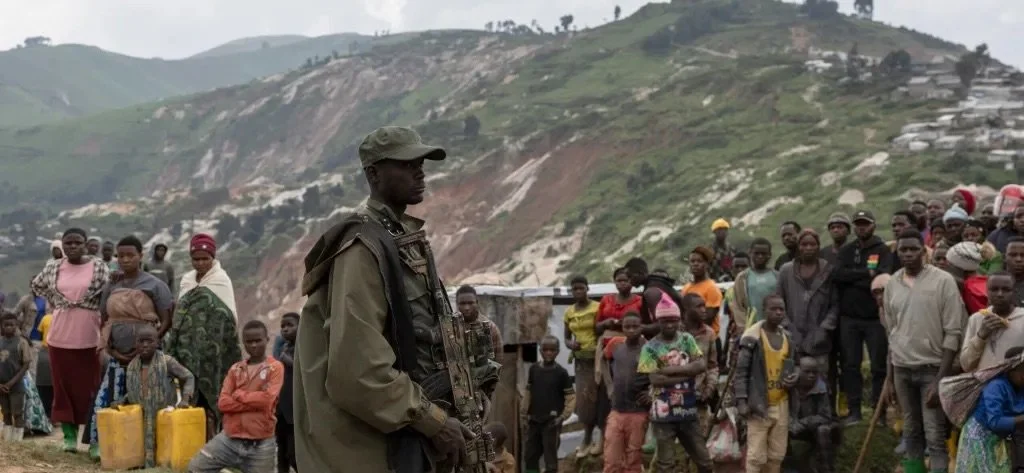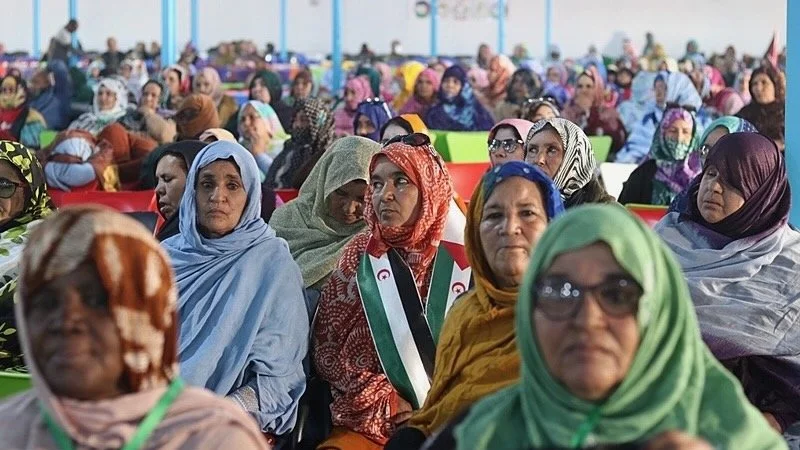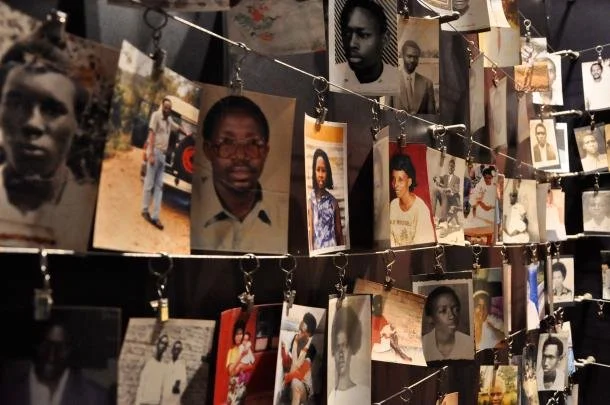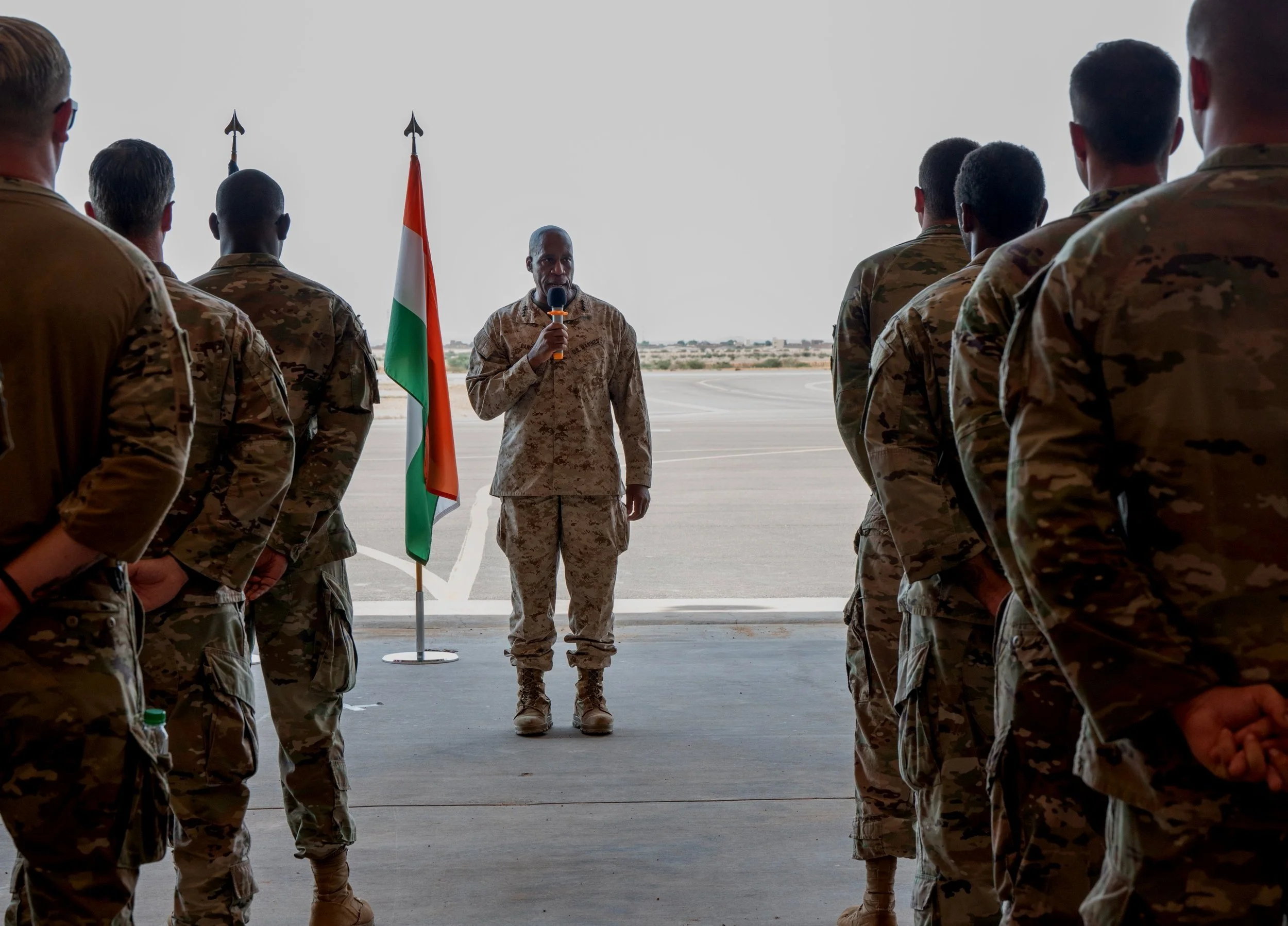The struggle for Western Sahara stands as one of Africa’s longest-running battles against colonialism and neocolonial occupation. Since Spain’s withdrawal in 1975, the Sahrawi people have resisted Moroccan annexation, enduring forced displacement, repression, and the theft of their land and resources. Today, as Morocco consolidates its illegal occupation with U.S., French, and Israeli backing, including through AFRICOM-linked military exercises, the Polisario Front has reignited armed resistance, refusing to let Western Sahara remain the last colony in Africa.
This fight is not isolated. It mirrors the broader contradictions of imperialism on the continent, where puppet regimes collaborate with foreign powers to suppress liberation movements while looting Africa’s wealth. The Sahrawi Arab Democratic Republic (SADR), recognized by the African Union, embodies Pan-African resistance, drawing solidarity from socialist and anti-imperialist forces worldwide. Yet, Western powers continue to prop up Morocco’s occupation, just as they back Israel’s genocide in Palestine, exposing the shared enemy faced by oppressed peoples globally.
The Sahrawi struggle is a litmus test for anti-imperialists. As they reclaim their land through armed resistance, their fight echoes a universal truth: liberation is never given. It is taken.
U.S. Out of Africa: Voices from the Struggle
AFRICOM Watch Bulletin spoke with India Pitts, who is an artist and organiser with the All-African People's Revolutionary Party and its women's wing, All-African Women's Revolutionary Union, based in occupied North Carolina.
AFRICOM Watch Bulletin: The Sahrawi people have been struggling politically for independence from first Spain and then subsequently Mauritania and Morocco since at least the late 1960s. For those who are just coming to be aware of your fight, who are the Sahrawi people and what is the Sahrawi Arab Democratic Republic's (SADR) national liberation struggle?
India Pitts: The Sahrawi people are made up of strong, beautiful, courageous, and determined Africans and Arabs who are waging a legitimate struggle for our land, in the Western Sahara territory. Being there on the ground, we identify politically as Africans, understanding the overall struggle for a United States of Africa. Similarly to other African countries, the Sahawari people have defeated colonialism and now are struggling against neocolonialism and the puppets who take on traits of the enemy. After the struggle for independence from Spain the Europeans, always choosing to be delusional, gave Western Sahara to Mauritania and Morocco. Like it was ever their legitimate land to give away! In 1979 Mauritania withdrew, leaving France/Spain/US/Israel backed Morocco to illegitimately occupy 70% of the Western Sahara territory. After showing three decades of patience waiting for Morocco to abide by the UN resolution to recognize Western Sahara’s sovereignty, the Sahrawi people were forced back into armed struggle in 2020. That brings us to the present day, where the armed struggle continues, as they gain more and more of our land back from western neocolonialist puppets and patriarchal governments like the Kingdom of Morocco.
In 1976 The Sahrawi Arab Democratic Republic was established by the Polisario Front as an independent state. The masses of Western Sahara chose the Polisario Front to represent us in the struggle for sovereignty in Western Sahara.
In character, the SADR, the Polisario Front, and overall Western Sahara’s evolution is Pan-African. The Polisario Front was established in 1973, and three years later proclaimed the Sahrawi Arab Democratic Republic. Between those years, in 1975, the honorable El-Ouali Mustapha Sayed and other revolutionaries from the Polisario Front gathered the leaders of the Sahawari Tribes to unite them in a national council and move them from a tribal bonding to national bonding. The tribal leaders responded and declared that they chose national unity under the leadership of the Polisario Front with Kwame Nkrumah’s (the founder of the All African People’s Revolutionary Party) understanding that independence is meaningless without African Unity.
At this time we would like to remind everyone that the Polisario Front is a revolutionary movement, a socialist national liberation movement, anti-colonial, anti-zionist, anti-capitalist, and pan-African in orientation. The Polisario Front is not a political party,
AFRICOM Watch Bulletin: We were surprised on January 7 with the announced suspension of relations between the Republic of Ghana and the SADR. Could you shed some light on this development please and also speak on the SADR’s relationship with other fresh political developments in the sub-region?
India Pitts: Similarly to Palestine, the Western Sahara struggle is a litmus test where neo-colonist puppets can't hide their true colors. Ghana’s decision did not surprise us at all given Nana Akufo-Addo's legacy. This is the same person who saddled Ghana with loans from the IMF up to 1.92 billion dollars, and commended western puppet William Ruto for sending police officers into Haiti, one of Africa’s 1st republics.
We are disappointed that many see this as representing the whole of Ghana. The masses of Ghana see this as a betrayal not only to the Pan-African movement, but to Kwame Nkrumah’s legacy of recognizing SADR since 1979 which reaffirmed Ghana’s commitment to justice and decolonization. We know Ghana has historically held a torch for the causes of anti-colonialism and sovereignty, extending support to movements in Africa and beyond. In the 2000s we saw this same trend of western puppets backing out on their support of SADR. This political development in Ghana is no different.
SADR in the present day continues to maintain relations with Cuba, Venezuela, Nicaragua, Yemen, North Korea, occupied Azania, Iran, Mali, Tanzania, Vietnam and Zimbabwe. Additionally Algeria has been a vital brother and sister to Western Sahara, providing aid, land and education to the Sahrawi people. Even with the US blockade and the occupation of Guantanamo Bay, Cuba still manages to provide doctors, medical supplies, and education to the Sahawari people, and many have attended university in Cuba as well.
Also we must mention that during the late 60’s, even before Algeria was backing Western Sahara, Pan-Africanist Gaddafi’s Libya supported our legitimate struggle in Western Sahara, including with tents which still stand today in our refugee camps in Algeria. Support also came from Pan-African, socialist, and anti-imperialist movements like those of Cuba, Vietnam, Burkina Faso, Tanzania, Venezuela, Columbia, Ghana, and Kenya.
AFRICOM Watch Bulletin: Can you please speak to the analogies between your struggles and those of the Palestinian people and discuss the impacts of Operation Al Aqsa Flood and the subsequent genocide in Palestine for your people?
India Pitts: The relationship between the Sahrawi and Palestinian causes dates back to the last century when the Polisario Front began coordinating with liberation forces in the region and across the Global South. Upon its establishment, the Polisario Front declared that the strength and continuity of the revolution depended on building relationships and establishing a joint struggle among peoples to confront imperialism and capitalist colonialism.
The Polisario Front implemented this revolutionary methodology immediately after its formation. The leader and martyr El Wali Mustapha Sayed made sure to visit Libya, Vietnam, Algeria, and Cuba, and coordinated with African leaders from various liberation movements. He also visited Beirut where he met with the Palestinian leader George Habash, alongside leaders and members of the Palestinian Liberation Front. This meeting marked the beginning of a long-standing relationship that continues to this day between the Palestinian and Sahrawi causes. George Habash visited Sahrawi refugee camps a year after the martyrdom of El Wali Mustapha Sayed in 1976. During his visit, George Habash emphasized that the fate of the two peoples are interconnected not only in fighting imperialism, but also in combating puppet regimes that represent colonial interests and perpetuate colonialism in the region. Of course foremost among them was the Moroccan regime. During that visit George Habash praised the struggle of the Sahrawi people and thanked them for fighting the Moroccan regime which poses a threat to the Palestinian cause. He also recalled the history of conspiracy and normalization initiated by Morocco with the Zionist entity against the Palestinian people. This relationship continues into the current phase where the Al-Aqsa Flood marks a new beginning for all struggling peoples living under the oppression of imperialism and colonialism. This phase is not merely a legendary armed struggle against a deeply entrenched colonial entity fortified with technology and the generous support of the U.S. empire. Rather it is a rewriting of revolutionary history and the decriminalization of armed resistance.
Since the 1980s American and European imperialism have pursued a strategy of ideological warfare by controlling the media, spreading the toxins of liberalism, and portraying liberation as an internal issue with dictatorial regimes that can be resolved through concepts of human rights and democracy delivered on the back of U.S. tanks, World Bank and IMF loans, blockades, and sanctions.
This approach contributed to the draining of the revolutionary spirit that accompanied national liberation wars. By funding movements and social justice organizations in the Global South, as well as criminalizing armed struggle and linking it to terrorism, imperialism ended decades of revolutionary work, political organization, and education that clarified to people their true enemy and equipped them with the necessary tools to confront it.
The Al-Aqsa Flood operation removed this veil and contributed to strengthening and enhancing the resistance of entire peoples, including the Sahrawi people who had resumed armed struggle against the Moroccan monarchy, a puppet of colonialism, on November 13, 2020. The Al-Aqsa Flood reinforced this path and marked the end of a phase in which our peoples were enslaved under the ideology of colonialism. The Zionist genocide in Gaza also exposed colonial conspiracies and the hypocrisy of the slogans they raised, revealing that the only lives that matter are those of the colonizers. The masks have been removed from the international community, the United Nations, and humanitarian organizations. It has become a firm conviction among the Sahrawi people, the Palestinian people, and oppressed peoples across Africa and the world, that the path to liberation lies in adhering to the option of armed resistance, allying with the peoples of the Global South, and strengthening revolutionary ties among all movements fighting against the U.S. empire of colonialism and European imperialism.
AFRICOM Watch Bulletin: There have been sporadic bursts of support for SADR positions from unlikely voices such as Condoleeza Rice or Robert F. Kennedy Jr. What do you make of these oscillations and how do they impact your assessment of what to expect from a new administration that contains both tendencies?
India Pitts: This question is closely related to a point mentioned in the previous question regarding the colonial conspiracy carried out by imperialism since the 1980s. When imperialism failed to defeat the revolutions against colonialism in the Global South and when oppressed peoples organized themselves under a socialist and revolutionary ideology that raised arms, theory, and practice, to repel capitalist imperialism (gaining popular support and engagement from all segments of society,) and when it failed to break the resolve of these peoples, it resorted to the most cunning forms of circumvention. It spread the toxins of liberalism and wielded the weapon of terrorism accusations and sanctions. It attempted to resurrect clownish figures and agents representing the U.S. system to deceive struggling peoples and movements into believing that it had changed its nature and was now concerned with their problems—problems that the U.S. itself had created. However it became clear to everyone that what the U.S. had changed was merely the snake's skin, while its venom, fangs, and tail remained intact, waiting for the right moment to strike.
Approaching the Sahrawi cause was a malicious U.S. strategy after the United Nations falsely promised the Sahrawi people a self-determination referendum once they laid down their arms against the Moroccan occupation and signed a ceasefire agreement.
The aim of this agreement was to exhaust the liberation movement, cut off its fighters' breath, corner it, and prevent it from liberating the remaining parts of its land. To achieve this strategy the U.S. beast oversaw the negotiations and played the role of a concerned party seeking to end this conflict, which it had created, making Morocco the occupying proxy on behalf of imperialism to retaliate against the Sahrawi revolution.
The revolution had declared war on Spain and France and announced itself as an anti-colonial, socialist revolution with a unifying orientation toward the peoples of the continent, which was a declaration of war on the U.S.
The U.S. intervened in 1975 through Henry Kissinger to engineer the Madrid Accords which divided the Western Sahara between Morocco and Mauritania as retaliation against this revolution. Subsequently the U.S. armed Morocco, its loyal ally in North Africa, and has continued to support it with weapons and political backing to this day. Therefore we always say that the truth of the Moroccan occupation is revealed by who supports it. Morocco is supported by France, the U.S., the Zionist entity, Spain, and European imperialism, while the Sahrawi people are supported by liberation movements in Africa, Asia, South America, the Caribbean, and all oppressed peoples and revolutionary consciences worldwide.
What these malicious U.S. figures did to the Sahrawi cause, they also did to the Palestinian cause. The U.S. consistently attempted, through the faces of its puppets, to project an image of neutrality while simultaneously arming and supporting Israel. The same applies to its limited stances on the Sahrawi issue.
As for the Sahrawi people and the Polisario Front, they were never deceived regarding the U.S.'s true nature. There was always a sense of wariness towards these maneuvers even though some individuals associated with the movement engaged in relationships with U.S. organizations as is the case in most African countries.
The decisive response to the reality of the conflict with the U.S. came in 2020 when Donald Trump, before the end of his term, recognized the sovereignty of the Moroccan occupation over Western Sahara through a Twitter post. Subsequently the Biden administration continued to silently support Morocco as had been the case before. Therefore the Sahrawi people expect no good from the U.S. colonial system, neither from the face that wears a mask to hide its true nature nor from the current fascist face led by Trump. The Sahrawi people have always known their friends and allies: the revolutionaries against colonialism, the free, and all those who fight against the U.S., Europe, and their agents.
AFRICOM Watch Bulletin: From a popular uprising standpoint, the Sahrawi self-determination struggle has been widely regarded as not only legitimate but inspiring. Also it is worth noting that the Black Alliance for Peace has a Shutdown AFRICOM campaign that is ironically implicated as both the United States and Morocco have used the Moroccan location of the annual African Lion Exercise (the largest AFRICOM exercise) as a bargaining chip to attempt to strongarm concessions in one direction or another. While we are clear in our U.S. Out of Africa perspective, do you have any thoughts on these relativities and any message or requests to the grassroots?
India Pitts: We encourage everyone to educate themselves on international affairs. There you will see the interconnectedness of our enemies. Not only is Morocco allowing the U.S. to host the annual African Lion Exercise but Morocco has Israel drone companies in the Western Sahara occupied territory.
Each company and government cooperating with Morocco, including in the integrated waters off the coast of Western Sahara that Morocco put into its maritime territory, have not tried to obtain permission to do so from the people of the Western Sahara. Instead they make agreements with these illegitimate settlers. This violates our right to self-determination in the Western Sahara occupied region.
Our enemies work together, historically and in the present day, similar to the US backing Israel in occupied Palestine. We saw this with our own eyes when we were commemorating the 50th Anniversary of the National Union of Sahrawi Women in the refugee camps. There we saw the army resources that Spain, the US, and France had provided for Morocco to continue to occupy the Western Sahara territory that the Polisario Front captured during our armed struggle.
We want the grassroots including the organizers everywhere to understand their responsibility to the international struggle against imperialism because our enemies and the enemies of nature, organize together to destroy humanity. Africans, everywhere, must understand our responsibility to Africa because our destiny is tied to Africa. We cannot continue to commemorate these flag independence days with Western Sahara occupied and Africa’s islands still being colonized. It is imperative that we organize against neocolonialism governments, all occupations, and European settlers!
News and Analysis
Congo in Crisis: A Conversation with Netfa Freeman
March 11, 2025 on KPFA's Hard Knock Radio
The Democratic Republic of the Congo (DRC) has long been at the center of geopolitical struggles, resource exploitation, and devastating conflict—issues that continue to shape the lives of millions. Davey D speaks with Netfa Freeman, of the Black Alliance for Peace Africa Team, about the ongoing crisis in the Congo, unpacking the historical and present-day forces fueling instability, including foreign intervention, multinational corporate interests, and the struggle for sovereignty. This also explores the role of grassroots resistance, Pan-African solidarity, and what people in the U.S. can do to support Congolese self-determination, connecting the Congo’s fight for liberation with global movements for justice.
Sahrawi political prisoners condemn Moroccan repression and intimidation
March 3, 2025 by Sahara Press Service
Sahrawi political prisoners from the "Gdeim Izik" group have denounced Morocco's repression in occupied Western Sahara, including violence and home sieges targeting activists. Their statement demands international protection for Sahrawis and MINURSO's expansion to monitor human rights abuses. The condemnation follows Morocco's crackdown on a peaceful protest marking the 49th anniversary of the Sahrawi Republic, where activists reaffirmed the Polisario Front as their sole representative. The prisoners urged global pressure on Morocco to end its occupation and respect Sahrawi self-determination rights.
New world, new hope: the struggle for a free Western Sahara continues
June 19, 2024 by Marc B. Sanganee
The Sahrawi people continue their decades-long struggle for liberation from Moroccan occupation, facing severe repression, economic exploitation, and international indifference. Since 1975, Morocco has controlled Western Sahara, violating human rights, malnourishing children, imprisoning journalists, and blocking humanitarian aid, while profiting from illegal resource extraction by Western companies. The Polisario Front, leading the resistance, resumed armed struggle in 2020 after Morocco broke a UN-backed ceasefire meant to enable a referendum on independence.
Is the Sudan Civil War Nearing an End?
March 28, 2025 by Black Agenda Radio
Abayomi Azikiwe, Editor of Pan-African Newswire, joins Black Agenda Radio from Detroit with an update on the two-year-long conflict in Sudan as government forces make headway in retaking the capital of Khartoum. Is this humanitarian crisis nearing its end? Abayomi Azikiwe provides analysis.
Hundreds killed in the “deadliest single bombing” of the war in Sudan
March 28, 2025 by Pavan Kulkarni
An SAF airstrike on a North Darfur market killed over 350 civilians on March 24, worsening famine conditions for 2 million people. The attack destroyed one of the last functioning markets in the region, where RSF forces have blockaded food aid. Over 12 million have been displaced in Sudan's two-year war, with overcrowded camps like Zamzam facing starvation. Both warring factions continue targeting civilians, as the UN warns famine may spread to five more areas by May.
Crisis escalates in the Congo: M23 advances, peace talks collapse
March 26, 2025 by Nicholas Mwangi
The M23 rebel advance in eastern Congo has captured key cities like Goma and Walikale, collapsing peace talks and displacing thousands. Despite mediation efforts, including a failed Congo-Rwanda summit, diplomacy has stalled. President Tshisekedi seeks U.S. military aid in exchange for mineral access, but civilians distrust his leadership amid corruption and a weak army. With Burundi accusing Rwanda of aggression and M23 rejecting dialogue, the humanitarian crisis worsens with no end to the conflict in sight.
US Africa Command Faces Challenges Under Trump
January 20, 2025 by Daniel Volman
Under Trump’s second term, AFRICOM is set for a dramatic shift in strategy, prioritizing great-power competition with China, counterterrorism escalations, and resource extraction, while ignoring human rights and regional stability.
Banner photo: 16th Sahrawi Congress in the Dajla refugee camp in the city of Tindouf, Algeria. Courtesy. Michele de Mello/ Brasil de Fato



















